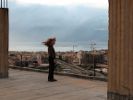Eye For Film >> Movies >> Corpo Celeste (2011) Film Review
One of the great pleasures of cinema is encountering a film that simultaneously transports the viewer to a different world, while highlighting human feelings – and social conventions – which are universal. Corpo Celeste will strike a chord with anyone whose childhood involved feeling out of place in a new town – or being forced to take part in a cringingly earnest Sunday School performance.
Rorhwacher’s assured and poignant debut – well-received at Cannes and screening as part of London Film Festival’s Cinema Europa strand – focuses on Marta (Yle Vianello), a girl in her early teens who’s just moved back to the southern Italian city of Reggio Calabria with her mother and older sister after spending most of her life in Switzerland.

Despite it being the family’s ‘home town’ she finds her run-down neighbourhood and the wintry coastal landscape strange and alien – and the influence of the Catholic Church on their lives even stronger.
The key event in a not exactly plot-driven film is the upcoming Confirmation ceremony – the Church’s marker of ‘adulthood’ for its young flock. Marta’s mother (Anita Caprioli), struggling to make ends meet with a dead-end job, is nevertheless determined that her daughter will look smart and make a good impression on their new neighbours come the big day. So a special dress is bought and Marta joins a class with all the other children rehearsing for the celebrations to accompany the formal ceremony.
These seem to consist mainly of a symbolic blindfold procession and performing the Italian version of What A Friend We Have In Jesus to a cheesy Europop beat. Marta takes part in the excruciatingly amateurish rehearsals, presided over by a somewhat over-obsessive church volunteer (Pasqualina Scuncia), with rapidly diminishing interest and conviction, her feelings only heightened by what she sees as the Church’s insidious presence in the family’s life.
The local priest (Salvatore Cantalupo) is also the rent collector and clearly considers it part of his duties to know everything about his parishioners’ lives and guide them in every decision they make – to the extent of telling them which candidate to vote for in the forthcoming elections. He’s also desperate to move on to a higher-profile post and determined that the ceremony, to which he’s invited the region’s bishop, will be a demonstration of his congregation’s faith and his own organisational skills.
As Marta mutely observes the manifold hypocrisies and cruelties of her community it becomes increasingly obvious that a personal rebellion is brewing and that the ceremony’s unlikely to go smoothly. A symbolic act of hair-cutting is the precursor to an extended climax where Marta finds herself accompanying the priest to a deserted country church to collect the ornate crucifix which is to be the ceremony’s centrepiece. The modern-day Church comes face-to-face with an emblem of a deeper, older Christianity while Marta’s problems bubble agonisingly near to the surface – and the bishop waits with growing impatience...
The influence of the Dardenne brothers’ Rosetta (particularly in the desaturated, hand-held camerawork) is obvious, and the film also shares a fair bit of DNA with Celine Sciamma’s recent Tomboy. But Rohrwacher also harks back to the flinty existentialism of the Italian neo-realists, as well as the more overtly political work of directors such as Francesco Rosi (whose 1979 work Christ Stopped At Eboli offered an equally forensic take on a harsh landscape and a harsher community).
The film’s desire to cram in a bit of everything – it’s also perceptive on the locals’ attitude to the North African immigrants who salvage a living among the local rubbish dumps and who Marta finds herself increasingly drawn to – and prevailing ‘life as it is’ aesthetic, sometimes results in a lack of focus and loss of dramatic impetus. Some of the supporting roles are a trifle overplayed – especially Scuncia’s repressed, passive-aggressive church worker, whose sublimated passion for the worn-down, underachieving priest is obvious to everyone but herself – and occasionally a point is hammered home rather than subtly underscored.
But for the most part it’s a sensitive, perceptive study of both a particular community and an individual recognising a universal truth – growing up is tough, and adults don’t always offer the best example of how to do it well. Helene Louvart’s cinematography offers a starkly beautiful study of the depressed far reaches of Berlusconi’s Italy, where both the buildings and the natural landscape seem bleached of colour by the harsh elements and even harsher effects of political and economic neglect. And the two central performances – Vianello’s bewildered, sensitive, lonely young girl and Cantalupo’s harassed moral inadequate – are pitch-perfect. You wouldn’t want to live in Marta’s world, but she has to. And the journey there is a moving and rewarding one.
Reviewed on: 12 Oct 2011

















